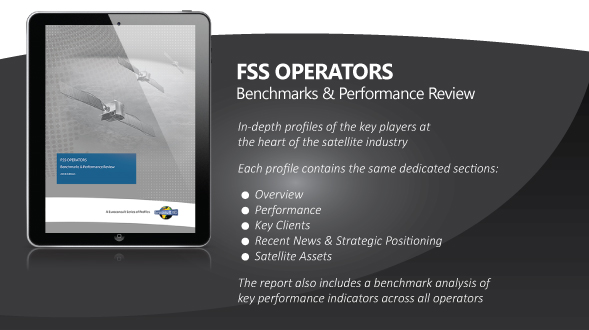New industry players, market dynamics, technologies to transform the industry
Paris, Washington D.C., Montreal, Yokohama, February 6, 2018 – According to Euroconsult’s newly-published report, FSS Operators: Benchmarks & Performance Reveiw, the size of the FSS market has been relatively stable over the last five years ($11.3B), but behind this total significant changes have played out. The market share of the top four operators has gradually eroded to 60%, while three new companies (YahSat, Thaicom and Insat) have joined the top ten. Twelve new players have emerged in the past five years including three in 2017 (BRI, BulgariaSat and Telebras) for a total of 46 revenue-generating operators at year-end 2017.
“The arrival of new players associated with the rapid expansion of supply and lower growth in demand has contributed to put pressure on FSS operators’ business, with margins, fill rates and revenue per transponder all lower today than they were five years ago,” said Dimitri Buchs, Senior Consultant at Euroconsult. “Transformation is expected to continue in the coming years, with new market dynamics (e.g. non-linear video services, managed services, connectivity anywhere and anytime) and evolutions in technology (e.g. NGSO constellations, terrestrial network expansion) significantly impacting the industry and the positioning of FSS operators, who will be forced to adapt their strategies in order to remain relevant in the future. The competitive environment is expected to become even more challenging in the coming years, as 11 new players are planning to enter the FSS GEO market by the early 2020s.”
The current market environment combined with expected competition is pushing industry players to make strategic changes, not only with regards to the types of satellites they launch but also in terms of market positioning and investments into new types of projects. Foreseen changes will include an increase in HTS payloads; the launch of satellite assets with enhanced flexibility in terms of coverage, power and bandwidth allocation; the accelerated development of new NGSO constellation projects; exploration of new growth segments, such as mobility; and a transition for operators from wholesale bandwidth suppliers to managed service providers to get closer to the end-user and avoid depending only on capacity wholesale revenues.
In other key findings from the report, 22 operators had revenues of more than $100 million, while 50% of all FSS operators increased the number of regular transponders leased through 2016. Thirteen operators had fill rates greater than 80%; fill rates decreased for two-thirds of operators. Finally, 19 operators distributed UHD channels in January 2018; SES and Eutelsat account for 60% of the total.
About the Report
FSS Operators: Benchmarks & Performance Review is the only assessment of all active and pre-operational FSS operators. The report includes publicly-listed and privately-held companies, global, regional and national operators. The result is a detailed profile of each company, providing exclusive data, expert review, and comprehensive analysis of both complex publicly-available information and hard-to-obtain private information. Different from its sister report, Satellite Communications & Broadcasting Markets Survey, which provides analysis and forecasts of the overall FSS industry using a consolidated approach, FSS Operators: Benchmarks & Performance Review focuses on the individual performance of each FSS operator.

